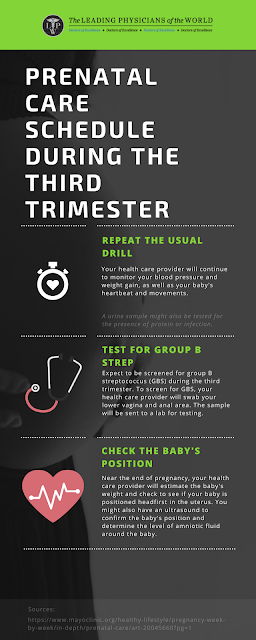Pregnancy Third Trimester
The third
trimester of your pregnancy is from week 29 to week 40 - months seven, eight
and nine. Feelings at this stage of pregnancy in most women tend to vary from
tiredness and worry to excitement about the baby. Your baby continues to grow,
and as the third trimester progresses the baby will have a better chance if it’s
born early. You’ll have more checks with the midwife in the third trimester, because
it’s important to keep an eye on your and your baby’s health.The position your
baby is in becomes more important now and you may start to think
about what happens during labor. You should definitely use these last few
weeks to get ready for the baby and enjoy some time for yourself, especially
after you start your maternity leave. Take any offers of help you can get.
Baby’s Growth during the Third Trimester
Your little
one will get lot larger in the third trimester, growing from about 2 1/2 pounds
and 16 inches long in week 28 of pregnancy to between 6 and 9 pounds and 19 to
22 inches long in week 40. In the last weeks, your baby is growing fast — so
don't be surprised if his increase in size along with a decrease in living
space leads to some serious kicks in your gut.
Here are a few of the highlights happening in your
third trimester of pregnancy:
Bones: As your baby transforms
cartilage to bone in months 7 and 8, he/she will be getting all of calcium from
you — so be sure to eat plenty of calcium-rich foods.
Digestive system: In the final weeks of
pregnancy, meconium — or baby’s first poop, consisting mostly of blood
cells, vernix and lanugo — starts to build up in baby’s intestines.
Five Senses: Your baby’s touch
receptors will be fully developed around week 29 or week 30.
By week 31 of pregnancy, your baby will get signals from all five
senses, perceiving light and dark, tasting what you eat,
and listening to the sound of your voice.
Brain: In the third trimester your
baby’s brain will grow faster than ever, test-driving some skills including
blinking, dreaming and regulating his/her own body temperature.
Changes in Your Body
Backache. The extra weightyou've
gained is putting added pressure on your back, making it feel achy and sore.
You might also feel discomfort in your pelvis and hips as your ligaments loosen
to prepare for labor.
Bleeding. Spotting may sometimes be a
sign of a serious problem, includingplacenta previa (the placenta grows
low and covers the cervix), placental abruption (separation of
the placenta from the uterine wall), or preterm labor. Call your doctor as
soon as you notice any bleeding.
Breast enlargement. By the
end of your pregnancy, your breasts will have grown by as much as 2
pounds. Make sure you're wearing a supportive bra so your back doesn't suffer.
Discharge. You might see more vaginal
discharge during the third trimester. If the flow is heavy enough to soak
through your panty liners, call your doctor. Close to your delivery date, you
might see a thick, clear, or slightly blood-tinged discharge. This is your
mucus plug, and it's a sign that your cervix has begun dilating in preparation
for labor.
If you
haven’t written your birth plan yet, you may wish to do it as the
labor approaches. It’s good to think about the different kinds of pain relief
that are available and what you may like to consider when
you’re in labor. Bear in mind, though, that your wishes may change and you
might also need some extra help during labor and birth, so keep an open mind.




Comments
Post a Comment